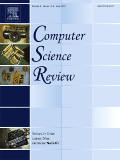
Computer Science Review
Scope & Guideline
Bridging Theory and Practice in Computer Science
Introduction
Aims and Scopes
- Comprehensive Surveys on Emerging Technologies:
The journal frequently publishes extensive surveys on cutting-edge technologies such as artificial intelligence, blockchain, and edge computing, providing insights into their applications, challenges, and future directions. - Interdisciplinary Research:
A significant focus is placed on interdisciplinary studies that integrate computer science with fields such as healthcare, finance, and environmental science, reflecting the growing trend of convergence among different domains. - Focus on Security and Privacy:
The journal emphasizes security and privacy issues within computing, especially regarding IoT, cloud computing, and blockchain technologies, highlighting the importance of safeguarding data and systems in a connected world. - Methodological Innovations:
There is a consistent focus on innovative methodologies, including deep learning, reinforcement learning, and metaheuristic optimization techniques, which are crucial for advancing computational capabilities. - Application-Oriented Research:
The journal covers application-driven research, exploring how theoretical advancements can be applied to solve real-world problems, particularly in areas like smart cities, healthcare, and autonomous systems.
Trending and Emerging
- Artificial Intelligence and Machine Learning Applications:
There is a marked increase in papers focused on the applications of AI and machine learning across various sectors, including healthcare, finance, and smart cities, reflecting the growing reliance on intelligent systems for decision-making. - Blockchain Technology and Its Applications:
Blockchain continues to be a hot topic, with an uptick in research exploring its applications beyond cryptocurrencies, particularly in areas like supply chain management, healthcare data security, and decentralized finance. - Edge Computing and IoT Integration:
Emerging themes around edge computing and its integration with IoT devices are gaining prominence, driven by the need for efficient data processing closer to the source and the demand for real-time analytics. - Natural Language Processing (NLP) Advances:
Recent publications have increasingly focused on NLP, showcasing advancements in language models and their applications in various domains, including sentiment analysis, chatbots, and legal question-answering systems. - Sustainability and Green Computing:
Research on sustainability and green computing practices is trending, highlighting the importance of developing energy-efficient computing solutions and the environmental impact of technology.
Declining or Waning
- Traditional Software Engineering Practices:
There is a noticeable decrease in publications focusing on traditional software engineering methodologies, as researchers shift towards more agile, DevOps, and cloud-native approaches that better accommodate modern development environments. - Basic Algorithm Surveys:
Surveys on basic algorithms, particularly those that do not incorporate machine learning or advanced computational techniques, are becoming less frequent, suggesting a movement towards more complex and sophisticated algorithmic frameworks. - Generalized Cybersecurity Topics:
While cybersecurity remains a critical area, the journal has seen a reduction in generalized surveys on cybersecurity, indicating a trend towards more specialized studies addressing specific threats, such as DDoS attacks or vulnerabilities in IoT. - Single-Domain Focus:
Research papers that focus solely on a single domain without interdisciplinary connections are declining, as the journal increasingly favors studies that bridge multiple fields and demonstrate the interconnectedness of technologies. - Static Data Structures and Basic Data Manipulation:
There is a waning interest in static data structures and basic data manipulation techniques, as the focus shifts towards more dynamic and adaptive data handling approaches suitable for big data and real-time processing.
Similar Journals

Journal of Cloud Computing-Advances Systems and Applications
Advancing Knowledge in Cloud ComputingThe Journal of Cloud Computing - Advances Systems and Applications, published by Springer, serves as a premier platform for disseminating cutting-edge research in the fields of cloud computing, computer networks, and software technologies. With an impressive impact factor and ranked in the top quartile for Computer Networks and Communications and Software categories in 2023, this open access journal has gained significant recognition within the academic community since its establishment in 2012. The journal not only provides valuable insights into innovative applications and advancements in cloud technologies but also supports collaboration among scholars, practitioners, and industry leaders. Operating from the vibrant hub of New York City, it boasts a robust international readership, ensuring that the latest findings reach a diverse audience. Authors and researchers are encouraged to engage with this vital resource, which is dedicated to exploring the transformative potential of cloud computing across multiple disciplines.

Journal of Grid Computing
Pioneering Discoveries in Collaborative ComputingThe Journal of Grid Computing, published by Springer, stands as a pivotal resource in the dynamic field of computer science, particularly within the realms of Computer Networks and Communications, Hardware and Architecture, Information Systems, and Software. With an impressive Q1 ranking across these categories in 2023, the journal exemplifies excellence and rigor, catering to a diverse readership from researchers to industry professionals. Established in 2003, this esteemed journal is anchored in the Netherlands and releases cutting-edge research that reflects trends and advancements in grid computing technologies. Researchers can gain insights through its vast contributions, while institutions benefit from its prestigious standing within the SCOPUS framework, boasting high percentile ranks in multiple computer science categories. Though not open access, the journal provides unparalleled access options for institutional subscribers, solidifying its importance as a gateway to innovative discoveries in high-performance distributed computing.
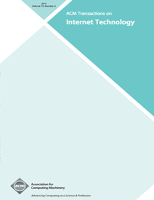
ACM Transactions on Internet Technology
Empowering Scholars in the Realm of Internet ScienceACM Transactions on Internet Technology, ISSN 1533-5399 (E-ISSN 1557-6051), is a premier journal published by the Association for Computing Machinery (ACM) that has made significant contributions to the field of computer science, particularly in the areas of computer networks and communications. Established in 2001, this journal has swiftly ascended to a prestigious Q1 ranking in its category as of 2023, demonstrating its influence within the scientific community, evidenced by its high Scopus rank of #41 out of 395 journals and a remarkable 89th percentile ranking. The journal serves as a vital platform for researchers, professionals, and students, offering a spectrum of scholarly articles that explore advancements in Internet technology, design, applications, and performance. With a commitment to high-quality research, ACM Transactions on Internet Technology is dedicated to fostering knowledge exchange and innovative problem-solving in an ever-evolving technological landscape. Readers can look forward to insights into both theoretical frameworks and practical implementations, making it an essential resource for cutting-edge research and developments in the digital frontier.
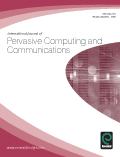
International Journal of Pervasive Computing and Communications
Exploring the future of computing and communication.The International Journal of Pervasive Computing and Communications, published by EMERALD GROUP PUBLISHING LTD, is a leading academic journal dedicated to advancing the field of pervasive computing and communications. With an ISSN of 1742-7371 and an E-ISSN of 1742-738X, this journal serves as a premier platform for researchers, professionals, and students to explore innovative applications and technologies that enhance connectivity and computing experiences. Operating from the United Kingdom, the journal has consistently maintained a strong impact within the academic community, achieving impressive Scopus rankings, including a Q2 status in Computer Science (miscellaneous) and Q3 in Theoretical Computer Science, as of 2023. The journal encompasses a broad scope, encouraging papers that discuss interdisciplinary approaches and novel methodologies in computing. By sharing cutting-edge research, the International Journal of Pervasive Computing and Communications plays a vital role in shaping the discourse surrounding pervasive technologies and their societal impacts, making it an essential resource for those looking to remain at the forefront of this dynamic field.
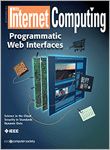
IEEE INTERNET COMPUTING
Exploring the Frontiers of Internet ComputingIEEE Internet Computing is a prominent journal in the field of computer networks and communications, published by the esteemed IEEE Computer Society. With an impressive impact factor and ranking in the Q1 category for 2023, it stands out as a vital resource for researchers, professionals, and students alike, seeking to delve into the latest advancements and trends in internet computing. Since its inception in 1997, the journal has provided a platform for pioneering studies and insightful discussions that bridge theory and practice in the rapidly evolving digital landscape. The journal is indexed with an excellent Scopus rank of #77 out of 395, placing it in the 80th percentile of its category, which underlines its relevance and influence in the academic community. While it currently does not offer Open Access options, its rich archive of scholarly articles remains accessible to those affiliated with research institutions and libraries. Furthermore, the journal's comprehensive coverage continues through 2024, ensuring it remains at the forefront of the discipline.

Computer Science and Information Systems
Connecting Ideas, Inspiring Discoveries in ComputingComputer Science and Information Systems, an esteemed journal published by the COMSIS CONSORTIUM, serves as a vital platform for researchers and practitioners within the field of computer science and information systems. With an ISSN of 1820-0214, this open access journal has been disseminating high-quality research since 2004, making scholarly content readily accessible to a global audience. Based in Novi Sad, Serbia, the journal has established itself as a point of reference in the academic community, achieving a Q3 ranking in the Computer Science (miscellaneous) category as of 2023. With its coverage spanning from 2008 to 2024, it caters to a diverse range of topics, including software engineering, data processing, and system architecture. Although the HIndex is currently not available, the journal holds a respectable 43rd percentile ranking in the Scopus database for general computer science, showcasing its relevance in the field. By offering an open access model, it ensures that groundbreaking research can be freely accessed and utilized, fostering innovation and collaboration across disciplines.
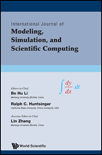
International Journal of Modeling Simulation and Scientific Computing
Transforming Data into Insightful SimulationsThe International Journal of Modeling Simulation and Scientific Computing, published by WORLD SCIENTIFIC PUBL CO PTE LTD, is a pivotal resource in the realms of Computer Science Applications and Modeling and Simulation. With an ISSN of 1793-9623 and an E-ISSN of 1793-9615, this journal serves as a platform for innovative and high-quality research from 2010 to 2024, contributing to the advancement of methodologies and applications in various scientific fields. Although currently categorized in the Q4 quartile for both recognized domains and positioned in the 42nd and 36th percentiles in the Scopus rankings for Mathematics and Computer Science respectively, the journal encourages scholarly exchange and fosters the integration of modeling and computational analysis in scientific research. Researchers, professionals, and students alike will find this journal an essential tool to stay updated with trends, methodologies, and cutting-edge findings in simulation and computational techniques that drive scientific inquiry today.

International Journal of Semantic Computing
Elevating Research Standards in Semantic ComputingThe International Journal of Semantic Computing is a premier scholarly publication focused on the intersection of artificial intelligence, computer networks, and linguistics, published by World Scientific Publishing Co PTE Ltd. Since its inception in 2007, this journal has strived to advance the field of semantic computing by promoting innovative research and interdisciplinary collaboration among professionals and academics. With a diverse scope that spans across various categories including Artificial Intelligence, Information Systems, and Linguistics, it boasts commendable rankings, particularly in the fields of Linguistics (77th Percentile) and Linguistics and Language (Rank #259/1167). The journal caters to a broad audience by offering critical insights and cutting-edge studies, thereby contributing significantly to knowledge enhancement in semantic technologies and computational linguistics. Although it does not offer open access options, its rigorous peer-review process ensures the publication of high-quality research that is invaluable for both researchers and students seeking to deepen their understanding in these rapidly evolving areas.

Scalable Computing-Practice and Experience
Cultivating Knowledge in Scalable TechnologiesScalable Computing - Practice and Experience, published by UNIV VEST TIMISOARA, stands as a significant platform for research and discourse in the realm of computer science, particularly focusing on practical applications and scalability in computing systems. Established in 2005, it aims to bridge the gap between theoretical advancements and real-world implementations, catering to a diverse readership that includes researchers, professionals, and students who are keen on exploring innovative computing practices. With an H-index reflective of its contribution and a Category Quartile of Q3 in Computer Science (miscellaneous), the journal offers a rich repository of knowledge, albeit currently not open access, from its base in Timisoara, Romania. The journal is included in Scopus rankings, underscoring its relevancy with a current rank of #144 out of 232 in the General Computer Science category, placing it in the 38th percentile. It invites contributions that expand the horizons of scalable computing methodologies and experiences, making it a vital resource for those engaged in this rapidly evolving field.

COMPUTING
Leading the Charge in Computational ExcellenceCOMPUTING, published by Springer Wien, is a prestigious journal that has been at the forefront of computational research since its inception in 1966. With an ISSN of 0010-485X and an E-ISSN of 1436-5057, this journal is renowned for its rigorous peer-reviewed articles that span across various domains such as Computational Mathematics, Numerical Analysis, and Theoretical Computer Science. The journal consistently maintains a high impact factor, securing a Q1 ranking in multiple categories including Computational Mathematics and Computer Science Applications, thereby reflecting its influential role in shaping contemporary academic discourse. Although it does not currently offer open access options, the journal is widely accessible within academic institutions. Given its significant placement in Scopus rankings—most notably Rank #5 in Numerical Analysis—COMPUTING is an essential resource for researchers, professionals, and students who are engaged in advancing the field of computing. With its scope extending to innovative methodologies and theoretical advancements, COMFORTING continues to attract high-quality submissions, making it a cornerstone publication in the computational sciences.